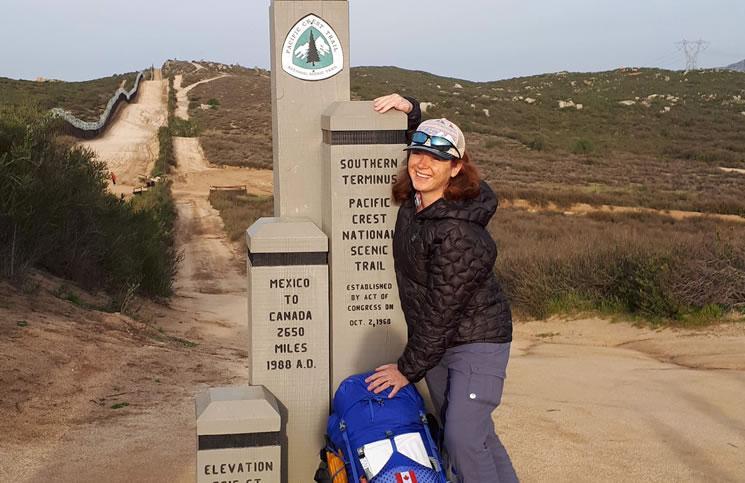The Pacific Crest Trail is a thru-hiker’s ultimate dream and worst nightmare all rolled into one. It’s 4,270 km long and ranges in elevation from just above sea level to 13,153 feet. The PCT passes among the world’s largest trees, some of the most fantastic rock formations and one of the driest deserts. It crosses one of North America’s largest rivers, and traverses a wide range of climates and landscapes, from low-lying to deserts to craggy high country to well-watered, mossy forests.
Since March, Linda Murphy, 57, a top-performing real estate agent at Royal LePage Relocations North in Collingwood, Ont. has been braving the PCT. She’s walked in 44 C weather and trekked through snow in temperatures of -6 C. Lightning strikes have forced her to run for cover and bees have tried to sting her. Rattlesnakes have made frequent appearances and unyielding bikers have almost run her over. Murphy is walking alone.
At one point a blizzard closed down a section of the trail, forcing all of the thru-hikers to immediately find shelter elsewhere. It seems like the trail is trying to weaken her, to defeat her, to stop her, perhaps even kill her, but Linda Murphy is a battler. She is a true warrior who doesn’t know what the word quit means. A woman on a quest who won’t be denied.
Her goal keeps her on the road. Why hasn’t she given up yet? “I’m raising funds and awareness for Canadian women and children who have experienced violence and are living in shelters,” Murphy says. “Every penny contributed will be divided between my hometown shelter in Collingwood (My Friend’s House) and others all across Canada, where women and children arrive every day – from their own homes, weakened from emotional abuse, injured from physical abuse, and in many cases, in fear for their lives and in search of a safe haven.”
At press time, Murphy had raised $22,000 and expects to take in close to $50,000 before her six-month journey is complete.
Between 500 and 800 individuals attempt the journey each year. Fewer than half of them finish. The average thru-hiker will take about five months to walk the entire trail, averaging 20-plus miles a day after factoring in rest days. For Murphy, this has been the toughest physical and mental challenge of her life.
“The first few weeks on the hike, you speak to no one. It could make some people go mad. You’re alone for hundreds of miles. I was in my head the entire time, singing songs from drama classes I taught when I was a teacher.”
After the first week she developed a tooth infection, which needed to be tended to by a dentist who prescribed her antibiotics. Down for the count, Murphy was back on her feet in a few days, only to start feeling incredibly sick once she started hiking again.
“I was having stomach cramps, nausea, vomiting, itchy skin, hives and my eyes and joints were all swollen.” Hitching a ride back to a small town, a doctor diagnosed her with giardiasis, the most frequently diagnosed intestinal parasitic disease in the United States for travelers. Giardia is found on surfaces or in soil, food or water that has been contaminated with feces from infected humans or animals. “The doctor told me I contracted the disease from drinking ground water,” says Murphy.
This time she was on the sidelines for two weeks and prescribed more antibiotics. After some well-deserved rest, she continued to push herself through the unknown radical conditions of the desert until she tore all the tendons in her back. By then she’d befriended many thru-hikers and they’d formed their own little hiking family. Worried about Linda’s health, they carried her until they arrived at a small town where a spine specialist massaged and manipulated her back until she was ready to continue her journey.
Today while talking to her on Skype at the base of Mt. Larssen, she seems to have come down with a terrible cold. “I’ve had to hitchhike into small towns to get supplies. The stories I’ve heard from these people are so inspiring. When I tell them I’m hiking for woman’s shelters, some have revealed their own traumatic stories of enduring and escaping abuse, while others are still involved in horrible relationships.”
Before taking on the PCT, Murphy was at best a casual hiker. She and her husband might spend the day hiking trails or climbing a mountain, building a fire and enjoying some cocktails before sleeping in the car or on an air mattress. Six months prior to facing the PCT she trained for the event but the trail is also won in the heart and mind.
Murphy has several websites set up to encourage people to donate to her cause. To direct 100 per cent of your donation towards shelters and domestic violence-prevention programs, click here.
Click here to help Murphy pay for her hiking expenses, which are approximately $15,000.
To get a glimpse of the trail and see what Murphy has been up against, check out her YouTube videos.













